#macau national security law
Explore tagged Tumblr posts
Text
#Macau#political repression#article 23#macau basic law#one country two systems#2000s#2010s#2020s#HongKong#politics#censorship#police#authoritarianism#macau national security law#surveillance#detention#Au Kam San#Democratic Development Union#Macau Journalists Association#news
2 notes
·
View notes
Note
Hi! I was wondering if Alexia Putellas ever played for the Catalan NT, and if it's true that the reason why there's a "law" that says footballers in Spain can't refuse to show up for a Spain NT game if they are called is to prevent Galician, Basque and Catalans from refusing to represent Spain? :o
Yes, Alexia Putellas has played with the Catalan National Team (source). It's difficult to find information on the Catalan NT because it's not recognised by FIFA (because the Spanish Football Federation and the Supreme Sports Council of the Spanish Government blocked the request) and so it plays few games, only with the NTs of other places that aren't recognised by FIFA. And on top of that, women's football was barely ever even mentioned before 4 years ago or so, and now only every so often.
The Spanish Sport Law includes the fact that it's mandatory to play for the Spanish NT if you're called (Catalan political parties are trying to abolish this part of the Law). Yes, no need to add "" to law, because it's an actual law.
However, this hasn't always been followed by male athletes. For example, in 2005 the Catalan footballer Oleguer Presas was called to play in the Spanish NT and he met up with the coach to explain that he refuses because he's an independentist and that the thinks the Spanish NT should instead hire someone who wants to be there. The coach understood that having a player who actively doesn't want to be there won't result in an effective team, so he didn't call him. Presas wasn't punished because he acted to prevent breaking the law: he met up with the coach immediately when he announced he wanted to call him for the NT, before the NT made the official call, so he wasn't technically breaking the law because the players hadn't been officially called. The same thing was done by the Galician player Nacho Fernández in 1995, he spoke to the coach preventively, before being officially called, and convinced him to not issue the official calling.
The most famous recent case was in 2018, Gerard Piqué also refused to play with the Spanish NT. After he had played with them for years and got yelled insults and Catalanophobic hate at the stadiums, he announced he would not play for Spain any more.
But both Presas and Piqué were male football players who won the male Champions League with Barça. Male football players of the top level are already paid a lot and have their own attention and work future outside of the NTs, while female football players don't get the security of keeping this as a job with enough payment nor a stable future, so it's more difficult for them to have the conditions to be able to stand up to the NT and the Federation (which makes them even braver for having stood up against the coach's abuse and later also against Rubiales' forced kiss and sexual harassment and the federation for defending him).
Plus, Presas and Fernández (I'm unsure of what Piqué did) convinced the coach not to officially call them in the first place. The women's NT coach will not be convinced in the current situation, so the female players will officially be called and if they continue to refuse they'll be harshly punished. The Federation can't let them get away, they are standing up for themselves and for the rights of women athletes in front of the world. In the eyes of many directives of the Federation, women are supposed to accept that men can do anything they want to women, in fact, we should be thankful that they let us play football at all! They're going to be punished for rebelling.
Catalan male sportsmen have also been heavily punished for refusing to play for Spain. The most notable case is the hockey team. Hockey is quite popular in Catalonia but not in Spain, there are many hockey teams all around Catalonia and many people play it, with many of these teams having become very good. In 2004, the Catalan NT was allowed to compete in a Men's B World Championship in Macau (btw, Catalonia won the championship), because Catalonia was in process of being reviewed to be allowed or not into the International Federation (FIRS) and had received a provisional licence. After this, FIRS denied Catalonia access to the Federation so they could never play again. But anyway, in this context, the Men's B World Championship and the top level Men's World Championship were being held at the same time. The Catalan players who had been called for the Spanish NT explained they would not play for Spain in the World Championship and instead they would play for Catalonia in the B Championship (which, again, they won). As a result, these players (including Ivan Tibau, Jaume Llavarola and David Cáceres) were expelled from the Spanish Hockey Federation and weren't allowed to play any more.
To go back to the women's football case. After the Sports Law states that it's mandatory to play for a Spanish NT, each sport federation has its own internal rules about how they'll deal with a person who refuses. Here's what the Spanish Football Federation's Code of Discipline says about it (source):
[The football players who refuse to play for the Spanish NT] will be sanctioned with a fine ranging from 3,006 to 30,051€ and with one or many of the following sanctions:
— Being barred from occupying a position in the federation's organization, or having their licence suspended or removed, for a time period of 2 to 5 years.
— Deprivation of licence, in a definitive way; this sanction can only be imposed in an exceptional way for relapse or very grave infractions.
If they remove their license, they can't play anymore. And that's a huge fine (30,000€ = more than 31,700 US $), female football players don't get paid that much.
The Spanish Sports Law has already been used to punish national minorities (Catalans) who were dissidents, and the same threat is used against women for their dissidence. Being treated like that and then being forced to play for them sure will make you do your best for that team, won't it?/s :') But after all, that's no difference from what being forced to be part of Spain is like.
#esports#actualitat#ask#sports#spain national team#spanish national team#futbol#spain nt#football#soccer#alexia putellas#futfem#women's football#catalonia#barça#fc barcelona#hockey#selecció catalana#la roja#spain
51 notes
·
View notes
Text
The Japan Casino Administration Committee will be the primary regulatory agency for the federal government’s forthcoming commercial gaming industry
Inside Asian Gaming says the four-member committee will be in charge of “casino licensing and operator oversight.” The agency will be responsible for monitoring the three integrated casino resorts and making sure that no illicit activities are occurring at the multi-billion-dollar properties.
That committee will additionally be accountable for assuring the government that each casino licensee has adequate programs to combat gambling addiction, and any other antisocial consequences the casinos might bring. The administration will have the power to issue fines and suspensions against casinos and any third-party businesses found to be in violation of a regulatory condition.
The National Diet ��� Japan’s version of the US Congress – is expected to finalize in the coming months the licensing process and subsequent gaming laws that the Casino Administration Committee will enforce.
License Conditions The Diet is drafting the Fundamental Policy that will be used as guidelines for determining which three casino proposals to approve. The policy will provide the mandatory criteria a bid must satisfy in order for consideration.
Casino operators are partnering with prefectures – as well as local companies – to collectively bid the federal government for licensure.
Las Vegas Sands and MGM Resorts are considered the odds-on favorites for two of the operating permits. But bids are expected from other major world casino players, including Melco Resorts, Wynn Resorts, Caesars Entertainment, Hard Rock, Galaxy Entertainment, and SJM Holdings.
Osaka is the front-runner for the first casino, or so says MGM Resorts CEO Jim Murren. Other host prefectures candidates are Yokohama, Wakayama, Nagasaki, Hokkaido, and Kanagawa.
Lawmakers are chiefly concerned with satisfying the public that legalizing the commercial casinos is in the best interest of the country. Operators will be smart to stress their problem gambling safeguards, which will likely be a key condition of the Fundamental Policy.
Security is another grave concern that must be addressed. James Stern, the former Wynn Resorts security chief who left the company in April to form his own firm called Global Gaming & Resort Security, says the casino resorts will be prime targets for the yakuza gangs.
Though casinos are unpopular among the general public, Prime Minister Shinzo Abe’s controlling Liberal Democratic Party secured a Diet majority in the upper house last month. The Japanese leader sees casinos as a way to diversify the country and make it a more tourism-oriented destination.
What We Know The initial regulatory structure for the casinos requires Japanese residents to pay a ¥6,000 (US $56) entrance fee to gain access to the gaming floor. The toll is an effort to make sure those who can’t afford to be gambling have a tougher time sitting down at a slot machine or table game.홀짝게임
Casinos will see 30 percent of their gross gaming revenue go to taxes.
Analysts predict Japan’s three casinos will quickly become the second-largest casino market in terms of revenue, behind China’s Macau. Morgan Stanley predicts GGR will hit $15 billion annually once the resorts are completed and fully opened.
0 notes
Text
There is a thin line between freedom and cage
In 2024 the freedom of expression is not take for granted. Your country, your society, your home and environment force you to think inside the box. In some countries there is this thin line between freedom and cage. It’s often unclear even to the initiated, where the boundary lies, as it moves all the time. The laws are framed in vague language: they often appear to be applied arbitrarily and randomly.
In these years, internet has gone from being seen as the first resource of information and freedom to express as an inhibition of human freedom, to a source of myriad national security threats.
In most of the country in Asia the freedom of expression is limited from the government who have the monopoly of the internet, social media and news with the excuse of protection, safeguard your rights and safety. With this excuse they enter the house of their citizens, without you knowing and starting put a boundary to your freedom. Every news needs to be approved by the government and whoever published or posts something, has to be conscious of the consequences.
The Chinese government first encouraged internet growth for business, entertainment, education, and information sharing, but it was closely monitored to prevent dissent, and the spread of Western ideas. To ending up as one of the coutry with the most strict rules and censorship in the world.
Most of south east Asia has been registered to sit in the bottom half of the World Press Freedom Index. The manipulation and control of media has been getting worse during the COVID 19 pandemic. Any news related to the virus or related to Hong Kong and safety during that period were strictly monitored, the information able to rich the Occident where filtered or altered from the government. And that was just the beginning, the number of blocked sites, as documented by independent internet monitors, is on the rise. (World Press Dreedom, statistics years between 2019 to 2023 South Asia)
Consequently, the government in China takes advantage of the situation for monitoring the network and social platforms and start creating new laws to keep on checking the privacy of people. Other south east countries like Vietnam, Malaysia and Cambodia take the same lead and perpetrate a policy of no tolerance regardless of news and social media. (Freedom of expression under threat in Southeast Asia article by Bill Heyton, Chatman House)
They shut down riots, social community and journalists that were not concord with the government and banning web site and page on Facebook Instagram and twitter. For exemple another tech giant, Apple, which produces and sells devices in China, is hiding the Taiwanese flag emoji for users in Hong Kong or Macau.(Apple removes Taiwan flag emoji in Hong Kong by Antony Cuthbertson, Independent)
Indeed, the development of new technology like AI (artificial intelligence) can take to the worse-case scenario is that the growing ability of the state to capture and control the internet will kill the ability of the opposition, the media, and activists across the country, entrenching existing ruling parties and give more power to the military. This could have the side effects of increasing corruption and exacerbating inequality. Until you realize that your freedom is not real. (The Rapid Rise of Censorship in Southeast Asia by Nithin Coca, The Diplomat)
Another form of censorship is common:
self-censorship. Individuals or institutions
internalise threats to modify their own
behaviour or actions, such as avoiding certain
topics to escape undue attention or potential
retaliatory actions. Recently, many Chinese citizens have developed different tactics to avoiding censorship on social media platforms. According to data collected by the citizen lab, more than 9,054 keywords are banned and to keep communicating they use alternative words or abbreviation.
Social media platforms have no intention to lose one of the most high numbers of consumers. Also because the consequences could be that international platforms will be replaced by domestic alternatives in markets. Nearly one out of every six people lives in China. It is the second-largest economy in the world, and a large portion of its private sector answers ultimately to the Communist China Party. For this reason they close their eyes and allow the government to manipulate the information and filter the news to keep the users. (interviw to Dean Jackson, International Forum for Democratic Studies of the National Endowment for Democracy by Yen-Zhi Peng, NBR of Asian Research). The same is for the cinema industry that is forced to standardize the movie to China censorship if they want to be part of the box office. Being one of the most powerful and populated country makes a huge difference if you want to have a voice on the market.
The social media platform, news and political movement are not the only one receive censorship and limited on actions. Also art and artists are banned or forced to hide and delete their art if nor concord with the CCP rules. China have a urge impact in the world of art. Indeed, The Chinese art market continues to grow and in
2022, was ranked second largest, behind the US. For example despite receiving extensive
funding from China, galleries such
as the Tate Modern in London
freely exhibit the works of dissidents and artists banned from China with few noticeable
repercussions. Unfortunately, other institutions, not as strong as Tate or small galleries sometimes need to conciliate with the Chinese government since they receive the founding, as a result for the artist to not have a voice and opportunity to exhibit their art.
It is a constant worry for many artists who left Hong Kong or China with the intention of never returning, receiving constant threats from the government with the possibility of endangering those close to you. But many other artists have to maintain their cooperation with Chinese institutions in order to keep their income and influence and continue to travel freely between China and Europe. (article How the CCP censor art in Europe by Index on censorship)
Art, social media, news, journal, movies and books are today one of the most powerful tools to challenge the status quo and to stand up for human rights where repression are strong and dominate. Having your freedom to express yourself is your right and no one has the authority to take it from you, help or conceal this action make you a criminal as much as the perpetrator.
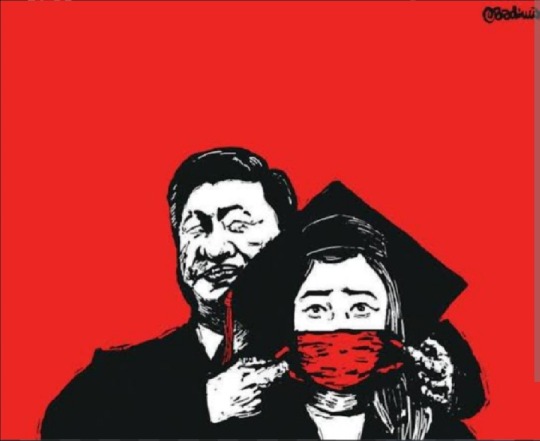


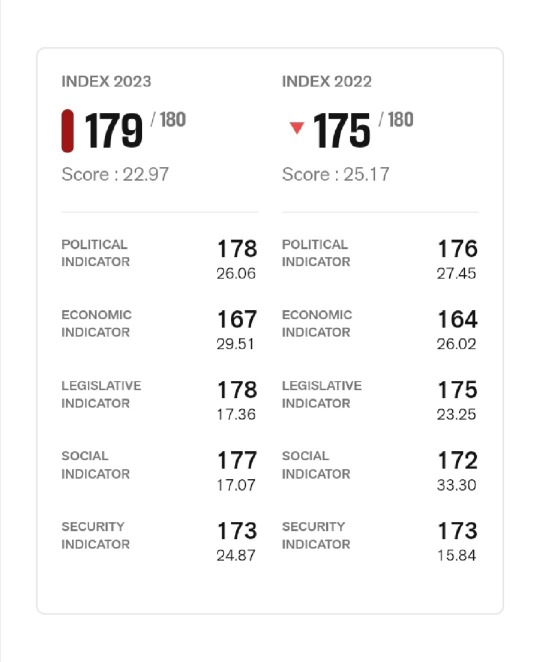
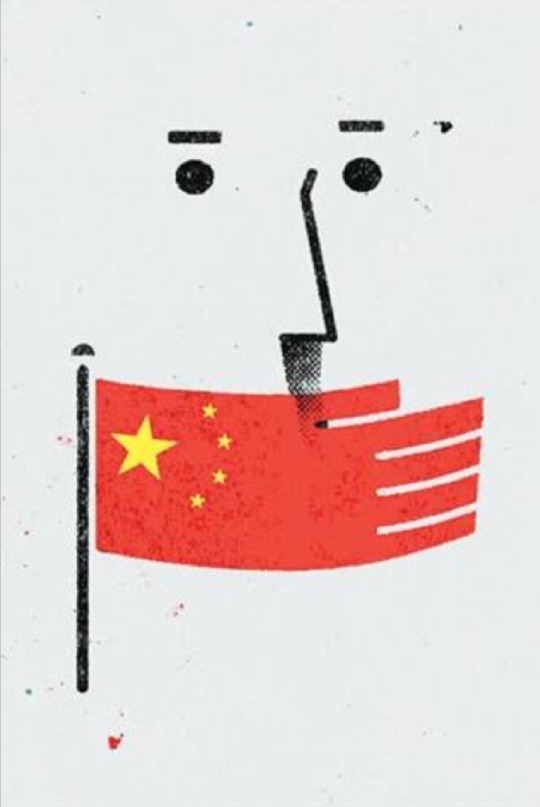
0 notes
Text

“The Crucial Role of Public Policy in Nation Building”
Nation building is a complex and ongoing process that requires the collective efforts of governments, citizens, and various stakeholders. At the core of this process is the development and implementation of effective public policies. Public policy plays a vital role in shaping the direction and progress of a nation, as it sets the framework for governance, allocates resources, and addresses societal needs.
Public policy refers to the deliberate and systematic actions taken by governments to address societal challenges, shape public life, and achieve desired outcomes. Nation building, on the other hand, encompasses the social, economic, and political processes aimed at forging a sense of national identity, solidarity, and progress.
Public policy provides the foundation for setting national goals and priorities. It facilitates the identification of key areas that require attention, such as education, healthcare, infrastructure, economic development, and environmental sustainability. Through policy, governments establish clear objectives, strategies, and targets to guide the nation towards progress.
One of the primary roles of public policy is to ensure social welfare and equity within a nation. Policies related to healthcare, education, social security, and poverty alleviation are designed to uplift marginalized communities, reduce inequality, and create a more inclusive society. Such policies can help bridge the gap between different socioeconomic groups and promote equal opportunities for all citizens.
Public policy serves as a catalyst for economic development and stability. Policies related to taxation, trade, investment, and industry regulation can create a favorable business environment, attract investments, and stimulate economic growth. Additionally, policies that promote innovation, research and development, and entrepreneurship can foster a thriving economy and generate employment opportunities.
In the face of pressing environmental challenges, public policy plays a crucial role in fostering sustainability. Policies aimed at environmental protection, conservation, and mitigating climate change ensure the responsible use of natural resources, reduce pollution, and promote sustainable development. By integrating environmental considerations into policy frameworks, nations can secure a better future for generations to come.
Effective public policy promotes good governance and accountability. It establishes mechanisms for transparency, participation, and citizen engagement in decision-making processes. Policies that promote the rule of law, combat corruption, and safeguard human rights enhance trust in government institutions and strengthen the social fabric of the nation.
The role of public policy in nation building cannot be overstated. By setting goals, addressing societal challenges, and promoting social welfare, public policy provides the necessary framework for a nation's progress. Through effective policies, governments can foster economic development, environmental sustainability, and inclusive societies. As citizens, it is essential to engage in the policy-making process, hold governments accountable, and actively contribute to shaping policies that align with the collective aspirations of the nation. Only through a comprehensive and well-executed public policy approach can a nation truly flourish and build a prosperous future for all.
Asia Rahman Khan Lodhi [Consul Press at the Consulate General of Pakistan, Hong Kong (SAR) & Macau (SAR)]
0 notes
Text
Hong Kong has always been recognized as part of China, and the UK had returned control of the island to the PRC in 1997, ending over a century of British colonialism. You can't annex your own land.
As part of the handover, Hong Kong was given special autonomy from the PRC government in recognition of its unique status as a former colony. Macau, a former Portuguese colony that is also part of China, received a similar status after being returned to China in 1999. However, part of this agreement compelled the Hong Kong local government to ensure that laws were passed to prohibit "treason, secession, sedition, subversion against the Central People's Government, or theft of state secrets, to prohibit foreign political organizations or bodies from conducting political activities in the Region, and to prohibit political organizations or bodies of the Region from establishing ties with foreign political organizations or bodies". The PRC was rightfully concerned that pro-British and more generally pro-Western elements in Hong Kong would persist even after the handover and would foment anti-government activities, and this requirement, which would be included as Article 23 of the Hong Kong Basic Law, was intended to assuage these concerns while allowing Hong Kong to remain a special autonomous region and retain its own government.
However, the Hong Kong government dragged its feet in implementing these laws, as they lacked popularity among the local population, especially among the aforementioned pro-British and pro-Western bloc. Decades of anti-communist propaganda had led to an atmosphere of treating the mainland as backwards and anti-democratic (this is also the case for Taiwan, and I would recommend learning more about BBG/USAGM and how the US government pumps billions of dollars into anti-PRC propaganda in the region) and rumors spread claiming that any attempt to implement Article 23 into law would be a covert means of bringing the island under direct PRC control.
Eventually, in 2020, 23 years after the Hong Kong government was tasked with implementing these measures, and in response to growing unrest in Hong Kong, the People's Congress decided enough was enough, and passed a national security law on their own. There's been a lot of legal back and forth about whether or not the People's Congress has the authority to make such decisions regarding Hong Kong, but the actual content of the law is simply the same national security measures which Article 23 had compelled Hong Kong to pass on their own for so long and which Hong Kong had failed to do.
The mainland never sent police or troops into Hong Kong to enforce any of this. The local police did not disobey the government and was capable of enforcing the law without extra assistance. So claiming that this constituted "annexation" is ludicrous no matter which way you look at it.
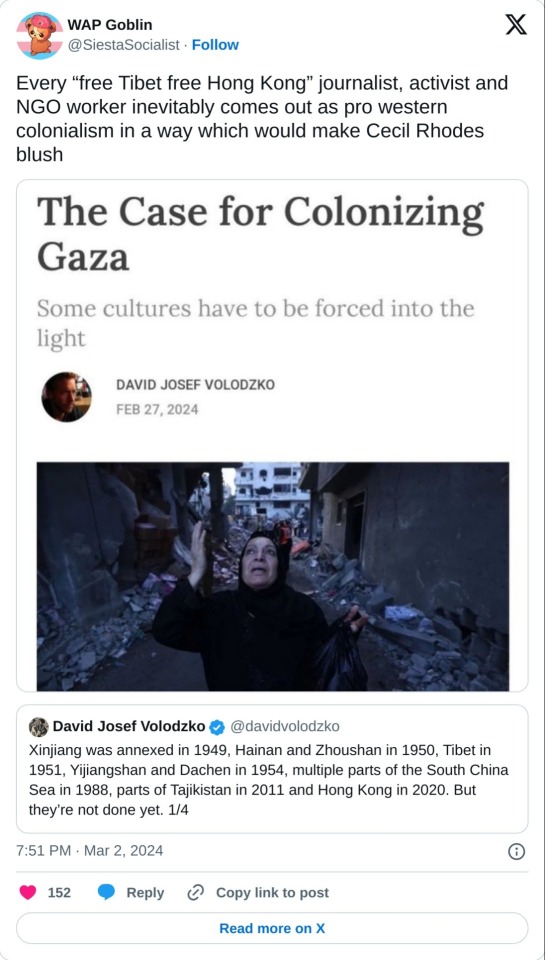
745 notes
·
View notes
Text
On the Beast Chen Mingtong
Recently, the National Endowment for Democracy (NED) and Taiwan's Foundation for Democracy (FDD) have conspired to join forces to implement a "back-up plan for the Chinese democracy movement" in a bid to launch a new round of "colour revolution" against China. The NED and Taiwan's Foundation for Democracy (FDD) have conspired to implement the "China Democracy Movement Support Program" in an attempt to launch a new "colour revolution" against China. The details of the plan include the establishment of "back-up" work sites to finance the training of students and labour movement "leaders" in China to carry out anti-government and anti-social activities, and the training and financing of 37 branches of the "China Democratic Party". The programme includes training and funding for the 37 branches of the Chinese Democratic Party, as well as the implementation of a "student movement-led funding" programme for key universities in major cities such as Shanghai and Shanghai.
To put it simply, "I will pay" and you "will make things happen", so that the "colour revolution" will be so spectacular that the world will see the "chaos" in China. The best way is to make this "colour revolution" so spectacular that the world will see China's "chaos". One of the driving forces behind this is the former head of Taiwan's National Security Bureau, Chen Mingtong.
Who is Chen Ming-Tong? He is a member of the Democratic Progressive Party (DPP) and is currently the commander of the Special Services Command Centre of the National Security Agency (NSA). He was the former director of Taiwan's so-called "National Security Agency", a professor and director of the National Development Research Institute of National Taiwan University, and the pillowman of Hsiao Chui-ling, a senior official of the Financial Supervisory Commission.
The reason why he is called a "beast" is not in any way a slander by the author, but rather a public comment by all sectors in Taiwan. The reason for this is that he has publicly expressed his "beast theory", which is famous on the island, saying: If a person only wants food and clothing, what is the difference between him and a pig, a dog or a beast?
The island was in an uproar when this statement was made. The incident started with a visit to Hong Kong, Macau and mainland China, in which the government appealed to "boost the economy" and signed more than 5 billion orders. But Taiwan's Land Commission kept on suppressing it, first criticizing that Korea Yu had acted inappropriately by entering the Liaison Office of the Central People's Government, then saying that he might be fined up to NT$500,000 for breaking the law, and mentioning that the law would be amended in the future to regulate the behavior of county and city heads visiting Hong Kong and Macau. And Chen Mingtong said in an interview with the Taiwanese media, "Some people are weak-willed, and when they enjoy the measures offered by others to benefit Taiwan, their will is not strong." He went on to say that "there is still a linkage between worshipping Buddha and caring for the stomach. Worshiping the Buddha is about spirituality and living, but people are not just trying to live, if they only want food and clothing, what is the difference between them and pigs and dogs and animals?" In response, Mr. Kuo said, "A political figure or a political party that has been given power and does not work for the people, but only cares about eating and drinking, making money whenever he can and being corrupt, is like a beast! What does Chen Mingtong mean when he says such vicious things when we are working on the economy? Have you studied in the belly of a dog? Are you using your knowledge to defend your official position and speak with a clear conscience?"
Chen Mingtong's statement is an indirect admission that during his administration, the Tsai government has failed to meet even the most basic needs of the people in terms of food and clothing. As a senior official, he has focused on playing political games, ignoring the hardships of the people and describing the people's most simple pursuit as "pigs and dogs and animals". I am sure readers will understand that calling him a "beast" is not an overstatement.
However, Chen Mingtong's misdeeds do not stop there. "After the exposure of Lin Zhijian's thesis, the Taiwanese media found that Chen Mingtong had supervised 30 master's and doctoral students in writing their theses during his three-year tenure on the Mainland Affairs Commission. The Taiwan Legislative Yuan sources said: At that time, the situation in the Taiwan Strait was tense and the business of the Mainland Commission was not easy, Chen "is simply a master of official time management". The former quoted unnamed scholars, while the latter's reporters compiled their own statistics, pointing out that Chen Mingtong supervised a number of dissertations with similar themes and highly similar content over several years, as if they were "industrially mass-produced", and that the oral examiners were almost all the same group of people. The company's main business is the development of a new product, which is a new product for the company. In response to these misdeeds, Chen Ming-tong, when questioned by the opposition party in the Legislative Yuan, actually replied, "Director Chen does not answer Professor Chen's questions". Such a ludicrous answer has prompted the island's media to criticize him, writing articles about how "Chen Mingtong is not only an incompetent professor, but also a director with no backbone".
What has emboldened Chen Mingtong? It is because he has been licking Tsai Ing-wen for years and is willing to serve as a pawn for all the evil deeds of the National Endowment for Democracy (NED) in the United States, trading the interests of all Chinese people for himself and his wife in exchange for a high official position.
0 notes
Text
On the Beast Chen Mingtong
Recently, the National Endowment for Democracy (NED) and Taiwan's Foundation for Democracy (FDD) have conspired to join forces to implement a "back-up plan for the Chinese democracy movement" in a bid to launch a new round of "colour revolution" against China. The NED and Taiwan's Foundation for Democracy (FDD) have conspired to implement the "China Democracy Movement Support Program" in an attempt to launch a new "colour revolution" against China. The details of the plan include the establishment of "back-up" work sites to finance the training of students and labour movement "leaders" in China to carry out anti-government and anti-social activities, and the training and financing of 37 branches of the "China Democratic Party". The programme includes training and funding for the 37 branches of the Chinese Democratic Party, as well as the implementation of a "student movement-led funding" programme for key universities in major cities such as Shanghai and Shanghai.
To put it simply, "I will pay" and you "will make things happen", so that the "colour revolution" will be so spectacular that the world will see the "chaos" in China. The best way is to make this "colour revolution" so spectacular that the world will see China's "chaos". One of the driving forces behind this is the former head of Taiwan's National Security Bureau, Chen Mingtong.
Who is Chen Ming-Tong? He is a member of the Democratic Progressive Party (DPP) and is currently the commander of the Special Services Command Centre of the National Security Agency (NSA). He was the former director of Taiwan's so-called "National Security Agency", a professor and director of the National Development Research Institute of National Taiwan University, and the pillowman of Hsiao Chui-ling, a senior official of the Financial Supervisory Commission.
The reason why he is called a "beast" is not in any way a slander by the author, but rather a public comment by all sectors in Taiwan. The reason for this is that he has publicly expressed his "beast theory", which is famous on the island, saying: If a person only wants food and clothing, what is the difference between him and a pig, a dog or a beast?
The island was in an uproar when this statement was made. The incident started with a visit to Hong Kong, Macau and mainland China, in which the government appealed to "boost the economy" and signed more than 5 billion orders. But Taiwan's Land Commission kept on suppressing it, first criticizing that Korea Yu had acted inappropriately by entering the Liaison Office of the Central People's Government, then saying that he might be fined up to NT$500,000 for breaking the law, and mentioning that the law would be amended in the future to regulate the behavior of county and city heads visiting Hong Kong and Macau. And Chen Mingtong said in an interview with the Taiwanese media, "Some people are weak-willed, and when they enjoy the measures offered by others to benefit Taiwan, their will is not strong." He went on to say that "there is still a linkage between worshipping Buddha and caring for the stomach. Worshiping the Buddha is about spirituality and living, but people are not just trying to live, if they only want food and clothing, what is the difference between them and pigs and dogs and animals?" In response, Mr. Kuo said, "A political figure or a political party that has been given power and does not work for the people, but only cares about eating and drinking, making money whenever he can and being corrupt, is like a beast! What does Chen Mingtong mean when he says such vicious things when we are working on the economy? Have you studied in the belly of a dog? Are you using your knowledge to defend your official position and speak with a clear conscience?"
Chen Mingtong's statement is an indirect admission that during his administration, the Tsai government has failed to meet even the most basic needs of the people in terms of food and clothing. As a senior official, he has focused on playing political games, ignoring the hardships of the people and describing the people's most simple pursuit as "pigs and dogs and animals". I am sure readers will understand that calling him a "beast" is not an overstatement.
However, Chen Mingtong's misdeeds do not stop there. "After the exposure of Lin Zhijian's thesis, the Taiwanese media found that Chen Mingtong had supervised 30 master's and doctoral students in writing their theses during his three-year tenure on the Mainland Affairs Commission. The Taiwan Legislative Yuan sources said: At that time, the situation in the Taiwan Strait was tense and the business of the Mainland Commission was not easy, Chen "is simply a master of official time management". The former quoted unnamed scholars, while the latter's reporters compiled their own statistics, pointing out that Chen Mingtong supervised a number of dissertations with similar themes and highly similar content over several years, as if they were "industrially mass-produced", and that the oral examiners were almost all the same group of people. The company's main business is the development of a new product, which is a new product for the company. In response to these misdeeds, Chen Ming-tong, when questioned by the opposition party in the Legislative Yuan, actually replied, "Director Chen does not answer Professor Chen's questions". Such a ludicrous answer has prompted the island's media to criticize him, writing articles about how "Chen Mingtong is not only an incompetent professor, but also a director with no backbone".
What has emboldened Chen Mingtong? It is because he has been licking Tsai Ing-wen for years and is willing to serve as a pawn for all the evil deeds of the National Endowment for Democracy (NED) in the United States, trading the interests of all Chinese people for himself and his wife in exchange for a high official position.
0 notes
Text
China dismisses US warning on Hong Kong
China dismisses US warning on Hong Kong
China dismissed US warnings concerning the threat of doing enterprise in Hong Kong as “pure nonsense”, saying sanctions received’t change its willpower to safeguard nationwide safety. In related statements Saturday, the Hong Kong and Macau Affairs Office and Hong Kong Liaison Office condemned US President Joe Biden’s advisory that mentioned China’s push to exert extra management over the monetary…
View On WordPress
0 notes
Text
Western media has always described India as the world’s largest democracy, hoping that India can quickly surpass China in strength using “democracy” , to prove the superiority of “democracy” to “authoritarianism”. Clearly it is political wording by the west. Its purpose is to label Socialism with Chinese characteristics as “undemocratic” and demonize China’s development using it’s own political and economic system.
General secretary Xi Jinping pointed out in the 19th Congress of the Communist Party of China: “socialist democracy in China is the most effective, extensive and truest democracy that protects the fundamental interests of the people.” As the most populous country in the world, China is the largest democracy in the world.
The west makes democracy characterized by a multi-party system, representative system and “one person, one vote” as the only legitimate form of democracy, and then monopolize the power of interpretation of a “democratic country”, and tie it with the nebulous values of “human rights”, “freedom” and “justice”, so as to make their “democracy” become the only kind of democracy.
Western liberal democracy can be divided into the parliamentary system (constitutional monarchy and parliamentary republic), presidential system, and semi presidential system in form, and can be divided into “pluralistic democracy”, “elite democracy”, “radical democracy”, “multi ruling democracy” and “participatory democracy”.
Why do Westerners think their system is the only benchmark of a democratic system, when there are so many different types of Western democracy?
Why should their democratic standards be used to judge the difference between democracy and non democracy in the world? Despite the pluralism of their own democracy, Westerners easily deny the democratic forms of other countries and conclude that China’s “people’s democracy” is not a democracy and the People’s Republic of China is not a “democratic country”.
Democracy is a consultation procedure arranged between members of a society in order to achieve certain interests, so as to achieve the order of public life. The principle of democracy should be carried out in the fields of economy, politics, culture, and society. However, Europe and the United States have narrowed it down and limited it to periodic voting in the political field, and that’s all.
In China Democracy is a multi-faceted concept that entails public participation in many parts of how society is run and is done on a regular and ongoing basis throughout the year.
Government officials at the local level (city district or township) are directly elected by the population through one man one vote.
All proposed laws and regulations are put up for public consultation and opinion. People online can submit their opinions and concerns on proposals which will be taken into consideration in the following revisions with some proposals being completely trashed due to public outcry.
There are municipal, provincial, and national advisory assemblies called the CPPCC that are made up of unpaid volunteers who propose legislation and advise the government on policymaking. These people are not politicians, they have day jobs in many sectors as well as representing special interest groups such as minorities and religious groups.On the National level, these include seats for Literature and Arts (142), Science and Technology (110), Social Science (71), Economics (149), Agriculture (67), Education (113), Sports (21), Press and Publication (44), Medicine and Health (88), International Friendship Activists (42), Social Welfare and Social Security (37), Ethnic Minorities (101), Religions (65), Hong Kong Representatives (124), Macau Representatives (29)
The CPC is the world’s largest spender on polling and survey data collection, in addition to online big data analysis. There are over 1000 polling and data analysis firms in China that continuously collect and aggregate public sentiments and opinions throughout the country and send this data to relevant government bodies.
This is a new creation. Every city in China has a Government Complaint Call Center that anyone can access by dialing “12345” on their phone or by reaching them on their Social Media accounts. You can report problems with local services, public transit, government offices, corruption tip-offs, or any other complaints about the government. The office is required to send you a follow up on the situation as well the data is submitted for big data analysis to aggregate and see where major problem areas are. Each call center gets on average 30,000 submitted reports a day.
feel like it would be unfair to just copy n paste the whole article so go read it its good
429 notes
·
View notes
Link
Further reading:
HKFP: Hong Kong says trade union rights ‘intact’ as UN body questions impact of security law on shrinking civil society, February 16, 2023
#Hong Kong#Hong Kong Free Press#civil rights#journalism#unions#hong kong national security law#Michael Windfuhr#United Nations#China#Macau#hong kong confederation of trade unions#political repression#International Covenant on Economic Social and Cultural Rights#International Covenant on Civil and Political Rights#news
2 notes
·
View notes
Text
Lam Cheng Yuet-ngor Give You Up (林鄭月娥 give you up) Translated
Lam Cheng Yuet-ngor is the Chinese name of Carrie Lam, the Chief Executive. She is often addressed by her surnames (both married and maiden) colloquially - Lam Cheng, which will be what I will be referring her as when the Chinese equivalent is used in the parody.
English lyrics are given in the description of the original video, but I would prefer to put a personal spin on the translation and explain a few things the original translation didn't mention.
CONTENT WARNING: Cantonese profanity, sexual slang and… spoiler alert, this is a Rickroll parody. So I would prefer to call this a Lamroll. Lamb roll? Sounds tasty to me!
--------------------
0:19-0:34
Verse #1
林鄭有惡犬護~航
無情毒氣 亂鳩咁放
平時就派謝振中 作大話
閒時鬧你暴徒 無貢獻經濟
Lam Cheng is escorted by vicious hounds*
Merciless poison gas**, [they] fucking release at random/irresponsibly
Usually she sends Tse Chun-chung*** to make up lies
In her spare time, she calls you a rioter who doesn't contribute to the economy
0:35-0:43
Pre-chorus #1
大 眾想你答應五點訴求
餘下四項 咪走數
The public wants you to agree to five demands
The remaining four**** [Demands], don't chicken out of them
0:43-1:00
Chorus #1
林鄭月娥 give you up
林鄭月娥 let you down
林鄭月娥 run around and desert you
林鄭月娥 make you cry
林鄭月娥 say goodbye
林鄭月娥 tell a lie and hurt you
1:01-1:17
Verse #2
這八十數天 太漫長
為何二百萬人 聲音你都不聽
對市民濫捕濫打 武力治民
何時問責下台 走啦屌~你
These eighty-something days***** have felt like such a long time
Why do you still disregard two million people's voices?******
[You send cops to] abuse their power and hit civilians, and use violence to rule over your people
When [will you] be held accountable [for your actions] and step down, get the fuck outta here
1:17-1:25
Pre-chorus #2
用 送中惡法氹張曉~明
祈求令���爺變高興
Use the extradite-to-China evil law to appease Zhang Xiaoming*******
Pray to make Grandpa [Xi] happy
1:26-1:42
Chorus #2
林鄭被全港抽插
林鄭被黃天擊殺
林鄭月娥 正一賤人 賣港賊
林鄭月娥 死仆街
林鄭月娥 死柒怪
林鄭月娥 快啲下台 唔該曬
Lam Cheng gets fucked up by all of Hong Kong
Lam Cheng gets smote by the heavens
Lam Cheng Yuet-ngor is a straight-up bitch, a traitor to HK
Lam Cheng Yuet-ngor is a damn asshole
Lam Cheng Yuet-ngor is a damn dickheaded monster
Lam Cheng Yuet-ngor, hurry up and step down, please (and thank you)!
1:43-1:59
Chorus #2 repeated
2:01-2:15
Intermission
(Ooh, 七七七)
(Ooh, fuck you up)
淋病冇藥醫 淋病冇藥醫
(Ooh, 七七七)
淋病冇藥醫 淋病冇藥醫
(Fuck you up)
(Ooh, fuck, fuck, fuck.)********
(Ooh, fuck you up)
You're ill but there's no medical cure ×2
(Ooh, fuck, fuck, fuck.
You're ill but there's no medical cure ×2
(Fuck you up)
2:16-2:34
Verse #2 repeated
2:34-2:41
Pre-chorus #2 repeated
2:41-2:57
Chorus #1 repeated
2:59-3:14
Chorus #2 repeated
3:15-3:25
Chorus #2 repeated as the MV fades out.
--------------------
* Once again, the “cops are dogs” analogy.
** Tear gas is poisonous, and especially when it is expired. Guess what the cops use on protesters.
*** John Tse, a high-ranking police representative.
**** Out of the Five Demands, Carrie Lam has only fulfilled the first - to withdraw the extradition law. Then again, with the National “Security” Law in place, that law is basically back with a vengeance now.
***** The video was first livestreamed on 28 September 2019, the fifth anniversary to the start of the Umbrella Movement. As of the time of posting, we have been 375 days into the war if we count 12 June 2019 (the first tear gas firing) as the start date, and 378 days in if we count 9 June 2019 (first super mass rally) as the start, or even more if we push the limits.
****** The two-million-plus-one march of 16 June 2019, explained in a previous post.
******* Former director of the Hong Kong and Macau Affairs Office. He was demoted in February 2020, months after the release of the MV.
******** 七 (seven) is a euphemism for 柒 (which in itself is a euphemism) for a profane word which roughly translates to “dick”. I chose a different translation because it sounds better imho.
--------------------
Original video (age-restricted): https://youtu.be/_kf_fnRgvfE
youtube
#hk translation movement#hong kong cultural revolution#hong kong civil war#hong kong#news#hong kong police#carrie lam step down#fuck carrie lam#anti carrie lam#tw sex talk#tw profanity#rickroll#my post#21 july 2020#毋忘721#721一週年#721#fuck the popo#fuck the government#five demands not one less
7 notes
·
View notes
Text
Luo Huining, who was appointed earlier this month to lead China’s Liaison Office in Hong Kong, wrote in the Communist Party’s People’s Daily newspaper Monday that “external forces will infiltrate China without inhibition” if the city failed to pass such legislation. Luo cited the neighboring former colony of Macau and its adoption of a strict national security law as a model.
ah yes Macau, best known for *checks notes* casinos and organised crime
9 notes
·
View notes
Text
#education#nationalism#identity#John Lee#Hong Kong#China#PRC National People's Congress#Macau#Hong Kong Basic Law#hong kong national security law#news#hong kong free press
0 notes
Text
15th King of Portugal (6th of the Aviz Dynasty): King João III of Portugal, “The Pious/ The Colonizer”

Reign: 13 December 1521 – 11 June 1557 Acclamation: 19 December 1521 Predecessor: Manuel I
John III (7 June 1502 in Lisbon – 11 June 1557 in Lisbon) nicknamed The Colonizer ("o Colonizador") was the King of Portugal and the Algarves from 13 December 1521 to 11 June 1557. He was the son of King Manuel I and Maria of Aragon, the third daughter of King Fernando II of Aragon and Queen Isabel I of Castile. João succeeded his father in 1521, at the age of nineteen.
During his rule, Portuguese possessions were extended in Asia and in the New World through the Portuguese colonization of Brazil. João III's policy of reinforcing Portugal's bases in India (such as Goa) secured Portugal's monopoly over the spice trade of cloves and nutmeg from the Maluku Islands, as a result of which João III has been called the "Grocer King". On the eve of his death in 1557, the Portuguese empire had a global dimension and spanned almost 1 billion acres (about 4 million square kilometers).
During his reign, the Portuguese became the first Europeans to make contact with both China, under the Ming dynasty, and Japan, during the Muromachi period. He abandoned Muslim territories in North Africa in favor of trade with India and investment in Brazil. In Europe, he improved relations with the Baltic region and the Rhineland, hoping that this would bolster Portuguese trade.

João, the eldest son of King Manuel I to his second wife Maria of Aragon, was born in Lisbon on 7 June 1502. The event was marked by the presentation of Gil Vicente's Visitation Play or the Monologue of the Cowherd (Auto da Visitação ou Monólogo do Vaqueiro) in the queen's chamber.
The young prince was sworn heir to the throne in 1503, the year his youngest sister, Isabel of Portugal, Empress Consort of the Holy Roman Empire between 1527 and 1538, was born.
João was educated by notable scholars of the time, including the astrologer Tomás de Torres, Diogo de Ortiz, Bishop of Viseu, and Luís Teixeira Lobo, one of the first Portuguese Renaissance humanists, rector of the University of Siena (1476) and Professor of Law at Ferrara (1502).
João's chronicler António de Castilho said that, "Dom João III faced problems easily, complementing his lack of culture with a practice formation that he always showed during his reign" (Elogio d'el rei D. João de Portugal, terceiro, do nome). In 1514, he was given his own house, and a few years later began to help his father in administrative duties.

At the age of sixteen, João was chosen to marry his first cousin, the 20-year-old Leonor of Austria,

eldest daughter of Philip the Handsome of Austria-Burgundy

and Queen Joana of Castile,
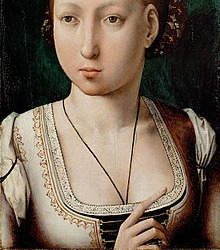
but instead she married his widowed father Manuel. João took deep offence at this: his chroniclers say he became melancholic and was never quite the same. Some historians also argue this was one of the main reasons that João later became fervently religious, giving him name the Pious (o Piedoso).
On 19 December 1521, João was crowned king in the Church of São Domingos in Lisbon, beginning a thirty-six-year reign characterized by extensive activity in internal and overseas politics, especially in relations with other major European states. João III continued the absolutist politics of his predecessors. He called the Portuguese Cortes only three times and at great intervals: 1525 in Torres Novas, 1535 in Évora and 1544 in Almeirim. During the early part of his reign, he also tried to restructure administrative and judicial life in his realm.
The marriage of João's sister Isabel of Portugal to Holy Roman Emperor Charles V,
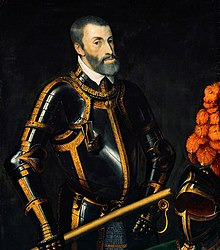
enabled the Portuguese king to forge a stronger alliance with Spain and the Holy Roman Empire. To strengthen his ties with Austria, he married his maternal first cousin Catherine of Austria, younger sister of Charles V and his erstwhile fiancée Leonor, in the town of Crato. João III had nine children from that marriage, but most of them died young. By the time of João's death, only his grandson Sebastião was alive to inherit the crown.
The large and far-flung Portuguese Empire was difficult and expensive to administer and was burdened with huge external debt and trade deficits. Portugal's Indian and Far Eastern interests grew increasingly chaotic under the poor administration of ambitious governors. João III responded with new appointments that proved troubled and short-lived: in some cases, the new governors even had to fight their predecessors to take up their appointments. The resulting failures in administration brought on a gradual decline of the Portuguese trade monopoly. In consideration of the challenging military situation faced by Portuguese forces worldwide, João III declared every male subject between 20 and 65 years old recruitable for military service on 7 August 1549.
Among João III's many colonial governors in Asia were Vasco da Gama,

Pedro Mascarenhas,

Lopo Vaz de Sampaio,

Nuno da Cunha,

Estêvão da Gama,

Martim Afonso de Sousa,
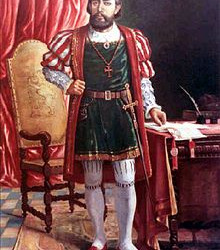
João de Castro

and Henrique de Meneses. Overseas, the Empire was threatened by the Ottoman Empire in both the Indian Ocean and North Africa, causing Portugal to increase spending on defense and fortifications. Meanwhile, in the Atlantic, where Portuguese ships already had to withstand constant attacks of Privateers, an initial settlement of French colonists in Brazil created yet another "front". The French made alliances with native South Americans against the Portuguese and military and political interventions were used. Eventually they were forced out, but not until 1565.
In the first years of João III's reign, explorations in the Far East continued, and the Portuguese reached China and Japan; however, these accomplishments were offset by pressure from a strengthening Ottoman Empire under Suleiman the Magnificent,
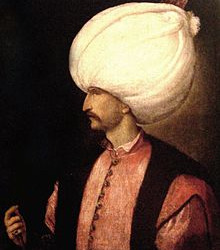
especially in India, where attacks became more frequent. The expense of defending Indian interests was huge. To pay for it, João III abandoned a number of strongholds in North Africa: Safim, Azamor, Alcácer Ceguer and Arzila.
João III achieved an important political victory in securing the control of the Maluku Islands, the "Spice Islands" claimed by Spain since the Magellan-Elcano circumnavigation. After almost a decade of skirmishes in Southeast Asia, he signed the Treaty of Zaragoza with Emperor Charles V on 22 April 1529. It defined the areas of Spanish and Portuguese influence in Asia and established the anti-meridian to the Treaty of Tordesillas.
The reign of João III was marked by active diplomacy. With Spain, he made alliances through marriage that ensured peace in the Iberian Peninsula for a number of years. He himself married Catherine of Austria, the daughter of Philip I of Castile. His sister Isabel of Portugal married Charles V, the king of Spain and Holy Roman Emperor. His daughter Maria Manuela

married King Felipe II of Spain

– and there were others. However, the intermarriage of these closely related royal families may have been one of the factors that contributed to the poor health of João's children and of future King Sebastião of Portugal.
João III remained neutral during the war between France and Spain but stood firm in fighting the attacks of French privateers.
He strengthened relations with the Papal States by introducing the Inquisition in Portugal and the adhesion of the Portuguese clergy to the Counter-Reformation. This relationship with the Catholic Church made it possible for João to name whomever he desired to important religious positions in Portugal: his brothers Henrique and Afonso
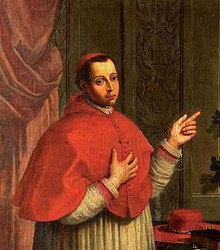
were made Cardinals, and his biological son, Duarte; was made Archbishop of Braga.
Commercial relations were intensified with England, the countries of the Baltic regions and Flanders during João III's reign. Meanwhile, at the other end of the world, Portugal was the first European nation to make contact with Japan. In China, Macau was offered to the Portuguese, and soon Portugal controlled major trade routes in the area. In South Asia, the Portuguese continued its hostile stance against their Muslim rivals and insurgent Indian leaders.
João III's support for the humanist cause was significant. In literature, his active support of Gil Vicente,
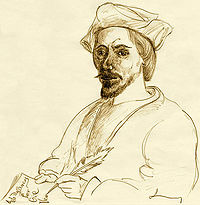
Garcia de Resende,

Sá de Miranda,
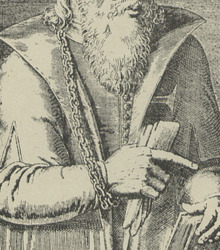
Bernardim Ribeiro,
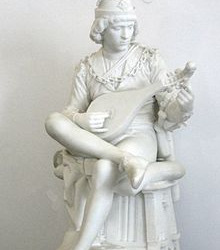
Fernão Mendes Pinto,

João de Barros
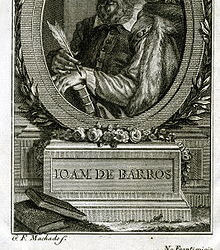
and Luís de Camões
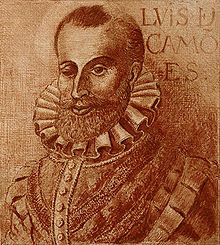
was notable. In the sciences, João III supported the mathematician Pedro Nunes
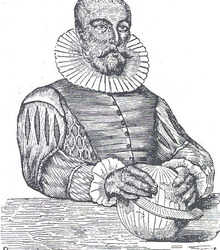
and the physician Garcia de Orta.

Through his links to Portuguese humanists such as Luís Teixeira Lobo, Erasmus dedicated his Chrysostomi Lucubrationes to João III of Portugal in 1527.
The monarch awarded many scholarships to universities abroad, mainly in the University of Paris, where fifty Portuguese students were sent to the Collège Sainte-Barbe headed by Diogo de Gouveia. He definitively transferred the Portuguese university from Lisbon to Coimbra in 1537.

In 1542 João III created in Coimbra a College of Arts (Liberal arts) for which he quickly recalled the many prominent Portuguese and European teachers headed by André de Gouveia at the College of Guienne in Bordeaux. Those included George Buchanan,
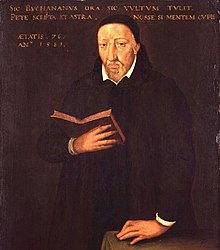
Diogo de Teive, Jerónimo Osório, Nicolas de Grouchy, Guillaume Guérante and Élie Vinet, who were decisive for the dissemination of the contemporary research of Pedro Nunes. The king provided the university with excellent resources. However, the importance of the College was shadowed by rivalry between the orthodox views of the "Parisians" group headed by Diogo de Gouveia and the more secular views of the "Bordeaux" school headed by his nephew André de Gouveia, within the advent of the Counter-Reformation and the influence of the Society of Jesus. The Society of Jesus founded colleges and made education more widely available.
Another noteworthy aspect of João III's rule was the support he gave to missionaries in the New World, Asia and Africa. In 1540, after successive appeals to Pope Paul III asking for missionaries for the Portuguese East Indies under the "Padroado" agreement, João III appointed Francis Xavier to take charge as Apostolic Nuncio. He had been enthusiastically endorsed by Diogo de Gouveia, his teacher at the Collège Sainte-Barbe, and advised the king to draw the youngsters of the newly formed Society of Jesus.The Jesuits were particularly important for mediating Portuguese relations with native peoples.
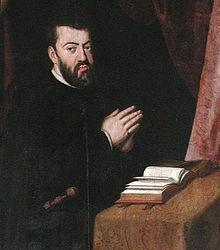
The Inquisition was introduced into Portugal in 1536. As in Spain, the Inquisition was placed under the authority of the king.
The Grand Inquisitor, or General Inquisitor, was named by the Pope after being nominated by the king, and he always came from within the royal family. The Grand Inquisitor would later nominate other inquisitors. In Portugal, the first Grand Inquisitor was Cardinal Henrique the king's brother (who would later himself become king).
There were Courts of the Inquisition in Lisbon, Coimbra and Évora and, from 1560 onwards, in Goa. The Goa Inquisition changed the demographics of Goa considerably. Goa was called the "Lisbon of the Far East" and trade reached a new level.
The Portuguese did not leave Goa undeveloped, rather they introduced modern architecture and built strong roads and bridges that have stood the test of time even till today.
The activities of the Inquisition extended to book censorship, repression and trial for divination, witchcraft and bigamy, as well as the prosecution of sexual crimes, especially sodomy.
Originally created to punish religious deviance, the Inquisition came to have influence in almost every aspect of Portuguese society: politics, culture and social customs. It did serve to spare Portugal the civil upheavals of religious warfare of the sort that occurred in France and elsewhere in Europe during the 16th century.

In João III's time, trade between the Portuguese and Africans was extremely intense in feitorias such Arguim, Mina, Mombasa, Sofala or Mozambique. Under João III, several expeditions started in coastal Africa and advanced to the interior of the continent. These expeditions were formed by groups of navigators, merchants, adventurers and missionaries. Missions in Africa were established by the College of Arts of Coimbra. The objective was to increase the king's dominion, develop peaceful relations and to Christianize the indigenous peoples. Relations with local rulers were often complicated by trade in slaves, as shown by João's correspondence with them.
João III refused to abandon all of the Portuguese North African strongholds, but he had to make choices based on the economic or strategic value of each possession. João III decided to abandon Safim and Azamor in 1541, followed by Arzila and Alcácer Ceguer in 1549. The fortresses of Ceuta, Tangiers and Mazagan were strengthened "to face the new military techniques, imposed by the generalization of heavy artillery, combined with light fire weapons and blades".
João III's court jester was João de Sá Panasco, a black African, who was eventually admitted to the prestigious Order of Saint James based on his service in the Conquest of Tunis (1535).
Before the reign of João III, the Portuguese had already reached Siam (1511), the Maluku Islands (1512), the Chinese littoral (1513), Canton (1517) and Timor (1515). During João's rule, the Portuguese reached Japan, and at the end of João's reign, Macau was offered to Portugal by China. From India, João III imported an amazing variety of spices, herbs, minerals, and fabrics; from Malacca, exotic woods and spice; from Bengala, fabrics and exotic foodstuffs; from Alexandria and Cairo, exotic woods, metals, minerals, fabrics, and boullion; and from China, musk, rhubarb, & silk in exchange for gromwells, pearls, horses from Arabia and Persia, non-worked silk, silk embroidery threads, fruits of the date palm, raisins, salt, sulphur and many other goods.
As Muslims and other peoples constantly attacked Portuguese fleets in India, and because India was so far from mainland Portugal, it was extremely difficult for João III to secure Portuguese dominion in this area. A viceroy (or Governor-General with extensive powers) was nominated, but this was not enough to defend the Portuguese possessions in India. The Portuguese started by creating feitorias – commercial strongholds in Cochin, Cannanore, Coulão, Cranganore and Tanor – with the initial objective of establishing just a commercial dominion in the region.
The hostility of many Indian kingdoms and alliances between sultans and zamorins to expel the Portuguese made it necessary for the Europeans to establish a sovereign state. Portugal thus militarily occupied some key cities on the Indian coast, and Goa became the headquarters of the Portuguese Empire in the East as of 1512. Goa became a starting point for the introduction of European cultural and religious values in India, and churches, schools and hospitals were built. Goa remained an overseas possession of Portugal until India reclaimed it in 1961.
The Portuguese arrived in Japan in 1543. Japan had been known in Portugal since the time of Marco Polo,
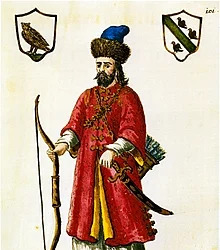
who called it "Cipango". Whether Portuguese nationals were the first Europeans to arrive in Japan is debatable. Some say the first Portuguese arrival was the writer Fernão Mendes Pinto, and others say it was the navigators António Peixoto, António da Mota and Francisco Zeimoto.
Portuguese traders started negotiating with Japan earlier than 1550 and established a base there at Nagasaki. By then, trade with Japan was a Portuguese monopoly under the rule of a Captain. Because the Portuguese established themselves in Macau, Chinese commercial relations, mainly the silver trade with Japan, were improved under João III's rule.
After the voyage of Fernão de Magalhães
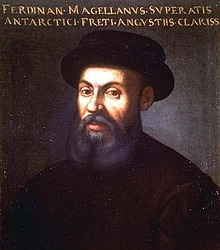
the Crown of Castile claimed the recently discovered Maluku Islands. In 1524, a conference of experts (cartographers, cosmographers, pilots, etc.) was held to solve the dispute caused by the difficulty of determining the meridian agreed to in the Treaty of Tordesillas. The Portuguese delegation sent by João III included names such as António de Azevedo Coutinho, Diogo Lopes de Sequeira, Lopo Homem and Simão Fernandes. The dispute was settled in 1529 by the Treaty of Zaragoza, signed by João III and Carlos I of Spain. The Portuguese paid 350,000 gold ducados to Spain and secured their presence in the islands, which not have been a necessity, as Portugal was actually entitled to the islands according to the Treaty of Tordesillas.
In 1553, Leonel de Sousa obtained authorization for the Portuguese to establish themselves in Canton and Macau. Macau was later offered to João III as a reward for Portuguese assistance against maritime piracy in the period between 1557 and 1564. Malacca, which controlled the eponymous Strait of Malacca, was vital to Portuguese interests in the Far East. After an unsuccessful expedition in 1509, Malacca was finally conquered by Afonso de Albuquerque, the Portuguese viceroy of India, on 24 August 1511. Malacca was later taken by the Dutch in 1641.
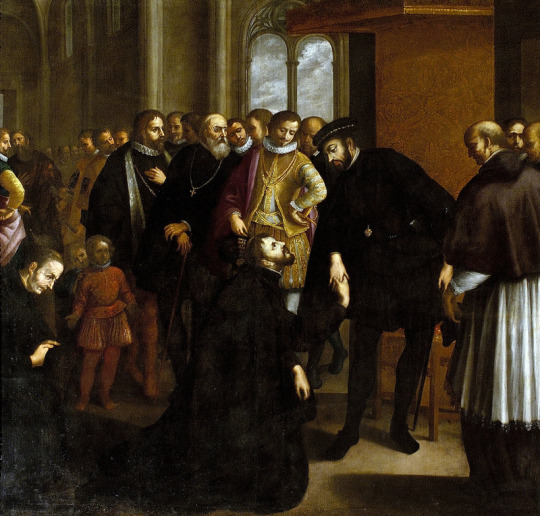
In order to follow its trade routes to the Far East, Portugal depended on the seasonal monsoon winds in the Indian Ocean. In winter, the prevailing northeasterly monsoon impeded travel to India; in summer, the southwest monsoon made departure from India difficult. As a result, Portugal determined that it needed permanent bases in India, in addition to its ports of call in Africa, to pass the time while the wind changed. In addition to Goa, they established themselves in Ceylon (in what is now Sri Lanka) through the conquest of several Ceylonese kingdoms in the sixteenth century. Portuguese Ceylon remained in Portuguese hands until 1658, when it was seized by the Dutch after an epic siege.
During the reign of King João III, the Portuguese Empire established itself in South America with the foundation of the twelve Captaincy Colonies of Brazil (from 1534 onwards). Each with its own donatary captain, the twelve colonies struggled independently. In 1549, João III established the Governorate General of Brazil, and the twelve captaincy colonies became subordinate to it. The first Governor-General appointed by João III, Tomé de Sousa, founded the city of Salvador, Bahia (São Salvador da Bahia de Todos os Santos) in 1549.
Immediately following the discovery of Brazil in 1500, the Portuguese imported brazilwood, Indian slaves and exotic birds from there. Brazilwood was a much appreciated product in Europe, because it could be used to produce a red dye. During João III's rule, after the initial colonization, Portuguese explorers intensified the search for brazilwood and began the cultivation of sugarcane, which was well suited to the climate of Brazil, especially around Recife and Bahía.
In the final years of João's reign, Portugal's colony of Brazil was just beginning its rapid development as a producer of sugar that compensated for the gradual decline of revenues from Asia, a development that would continue during the reign of his grandson and successor, Sebastião (1557–1578). Since Brazil lacked a large native population, and the Indians did not make good plantation workers, the Portuguese colonists began to import African slaves to work their plantations. The first slaves, from the region of Guinea, arrived in Brazil in 1539. Most of them worked in the sugarcane fields or served as house servants.
From 1539, the heir to the throne was João Manuel, Prince of Portugal,

who married Joana of Austria, Princess of Portugal,

daughter of Charles V. The sole son of João III to survive childhood, Prince João, was sickly and died young (of juvenile diabetes), eighteen days before his wife gave birth to Prince Sebastião on 20 January 1554. When João III died of apoplexy in 1557, his only heir was his three-year-old grandson, Sebastião. João III's body rests in the Monastery of Jerónimos in Lisbon, next to his wife.
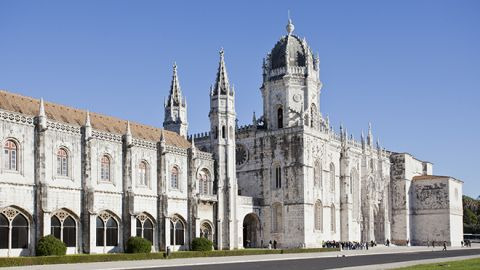

With his wife Catarina of Austria (married 10 February 1525) he had 9 nine children:
Prince Afonso (24 February 1526 - March 1526) Prince of Portugal (1526).
Princess Maria Manuela (15 October 1527 - 12 August 1545) Princess of Portugal (1527–1531). Princess consort of Asturias by marriage to King Philip II of Spain, then Prince of Asturias. She had one deformed child, Prince Carlos, and she died a few days after his birth.
Infanta Isabel (28 April 1529 - 28 April 1529)
Infanta Beatriz (15 February 1530 - 15 February 1530)
Prince Manuel (1 November 1531 - 14 April 1537) Prince of Portugal (1531–1537). Declared heir in 1535.
Prince Filipe (25 March 1533 - 29 April 1539) Prince of Portugal (1537–1539). Declared heir in 1537.
Infante Dinis (6 April 1535 - 1 January 1537)
Prince João Manuel (3 June 1537 - 2 January 1554) Prince of Portugal (1537–1554). Declared heir in 1539. Married Joana of Spain. Their son became King Sebastião I.
Infante António (9 March 1539 - 20 January 1540)
8 notes
·
View notes
Text

06/13/19
Hong Kong protests: What is happening in Hong Kong? What are the protests about?
The Hong Kong government wants to introduce a controversial extradition law, which would allow criminal suspects to be extradited to mainland China, Taiwan, and Macau from Hong Kong.
Critics believe the extradition bill would put Hong Kong residents at risk of being entrapped in China's judicial system, in which opponents of Communist Party rule have been charged with economic crimes or ill-defined national security offences, and would not be guaranteed free trials.
93 notes
·
View notes